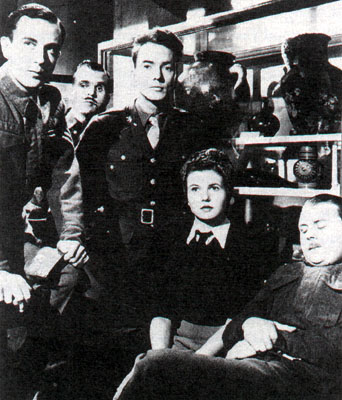A Yank at Denham
C.A. Lejeune, 5th Dec, 1943

From left: Dennis Price, Esmond Knight (behind), John Sweet, Sheila Sim (seated) and Graham Moffatt (sleeping)
|
Meet the first member of the United States Forces to appear in a British feature film. He is Sgt. John Sweet of Granville, Ohio, and he plays a leading role in the new Michael Powell - Emeric Pressburger film, A Canterbury Tale. This will be Sergeant Sweet's second induction into drama since he arrived in this country a year or so ago. Last summer he was picked to play Francis Marion in the American Forces' production of The Eve of St. Mark at the Scala Theatre, London. This show, sponsored by the Army and the Red Cross, ran for eight weeks, and the long, stringy young man from the Middle West got himself quite a reputation as an actor.
Director Powell (of The Invaders and One of Our Aircraft is Missing) casting around for someone to play an American soldier in his tale of a modern pilgrimage to Canterbury, saw Sweet, coveted him, sold a true bill to the United States Army bosses [John was working on General Eisenhower's HQ staff] and got permission to borrow him for the film. Powell says he's a natural as an actor; the only young man he's met, except Burgess Meredith, who can play an honest-to-goodness Middle Westerner and make the British public understand him.
A Teacher at Heart
Sgt. John Sweet is 28 and an ardent Maxwell Anderson fan; long, lanky, with a shock of wiry dark hair, the kind of ears you notice and hazel-green eyes so deeply set they almost disappear in the creases. It's a rugged face, a corn cob philosopher's face, the face of a young and ardent Will Rogers. When we met the sergeant down at the Denham studios he'd been in bed for a couple of days. Or, to be exact, he'd been on a bed - one of those carved-oak, canopied affairs that Queen Elizabeth slept around on so much. While the engineers were trying to locate a squeak in the mike ("or more like a kind of groan") Sergeant Sweet strolled over for a chat, and lit up one of his inevitable corncob pipes. (He brought fifteen of them to England in his army kit.) He was wearing striped pajamas, army boots, which he promptly kicked off to stand in bare feet, and a red silk-figured dressing robe.
He told us he'd never played in a film before and only acted at home in school theatricals, "the ordinary sort of summer-vactaion shows, with four or five other kids." He's married to a girl from Boston called Monrovia and has a small daughter called Monrovia too. He doesn't want to be an actor. He means to be a teacher. In point of fact, he is a teacher. He graduated from Columbus University, put in five years' special training, got the job of his heart just before he joined the Army teaching in an industrial school. They're holding the job open for him, he says, and he's going rigt back to it after the war. Acting's all right, Sweet thinks, as a kind of secondary interest, a way of teaching by remote control.
John Sweet is one of three newcomers who get leading parts in A Canterbury Tale. The other two are British. Sheila Sim, who plays the land-girl heroine, is a 21-year-old creamy blonde. "A nice Madonna type" is the way Michael Powell describes her. Dennis Price, who plays a British Tommy, is a Noel Coward protégé. He served two years in the Army, was invalided out, then went on tour with Coward in his new plays, Present Laughter and This Happy Breed, and finally took over the leading parts when the star fell ill. Except that he's almost twenty years younger and an inch or so taller, Price is a dead ringer for the boss.
Not Like Chaucer
As Mr. Powell explained it, A Canterbury Tale is about four modern people who meet in wartime Canterbury and who are all, in their own ways, pilgrims of a sort. There's a local Justice of the Peace, with a fanatical passion for the land. There's a girl, who fancies her lover in the R.A.F. has been killed, and visiting the scene of their old romance. There's the American sergeant whose grandma came from the old country and who is taking a reluctant look at Canterbury Cathedral to satisfy the folks back home. There's the British Tommy, who believes himself a tough materialist until he plays the cathedral organ for the boys who are going overseas.
The film begins with a five-minute prologue from Chaucer's own Canterbury Tales. A peregrine, cast off from a knight's wrist, and changing into a Spitfire in mid-air, marks the transition to modern times. Mr. Powell's intention, if we get him right, is to show that past and present are all one. "After the prologue" he says, "there is no visual flashback to Chaucer's day. The characters aren't doubled. There is only an implied reference between Chaucer's pilgrims and ours. But we hope to get the parallel across, chiefly by sound. I'm not going to give away the tricks, but you'll suddenly be aware, in a modern Kentish street, of noises and echoes from the past. Horses' hoofs, harness bells, medieval chants. A great deal of the film has been done on location near Canterbury, and every inch of that part of this country is stuffed with stories from the past.
Back to index


